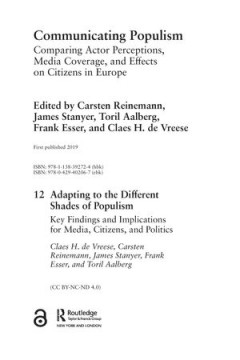Filter by

Intellectual Property in the Global Arena: Jurisdiction, Applicable Law, and …
The private international law of intellectual property is currently much debated both in Europe and abroad. Art. 8 of the Rome II Regulation of 2007, which codifies a territorial approach for the infringement of intellectual property, has provoked an intensive discussion in Europe as to whether the lex loci protection is still appropriate for intellectual property litigation in the age of world…
- Edition
- -
- ISBN/ISSN
- 9783161504440
- Collation
- -
- Series Title
- -
- Call Number
- 300

Individuals and Institutions in Medieval Scholasticism
This volume explores the relationship between individuals and institutions in scholastic thought and practice across the twelfth and fifteenth centuries, setting an agenda for future debates. Written by leading European experts from numerous fields, this theoretically sophisticated collection analyses a wide range of intellectual practices and disciplines. Avoiding narrow approaches to scholast…
- Edition
- -
- ISBN/ISSN
- 9781912702275
- Collation
- -
- Series Title
- -
- Call Number
- 300

Huizhou: Local Identity and Mercantile Lineage Culture in Ming China
Huizhou studies the construction of local identity through kinship in the prefecture of Huizhou, the most prominent merchant stronghold of Ming China. Employing an array of untapped genealogies and other sources, Qitao Guo explores how developments in the sociocultural, religious, and gender realms from the fifteenth to sixteenth centuries intertwined to shape Huizhou identity as a land of "pro…
- Edition
- -
- ISBN/ISSN
- 9780520385221
- Collation
- -
- Series Title
- -
- Call Number
- 300

Handbook of Direct Democracy in Central and Eastern Europe after 1989
Since the collapse of the Soviet Union the political history of Central and Eastern Europe has been mainly the story of arise, consolidation, transformation and struggles of new democratic regimes and societies. The handbook offers an instructive approach to that history focusing on the relevance of practices and institutions of direct democracy. It collects 20 political analyses of direct demo…
- Edition
- -
- ISBN/ISSN
- 9783847421221
- Collation
- -
- Series Title
- -
- Call Number
- 300

Ginseng and Borderland
Ginseng and Borderland explores the territorial boundaries and political relations between Qing China and Chosŏn Korea during the period from the early seventeenth to the late nineteenth centuries. By examining a unique body of materials written in Chinese, Manchu, and Korean, and building on recent studies in New Qing History, Seonmin Kim adds new perspectives to current understandings of the…
- Edition
- -
- ISBN/ISSN
- 9780520295995
- Collation
- -
- Series Title
- -
- Call Number
- 300

7 Community identity and mobilisation
Romani political mobilisation is now an established part of the civil society landscape across Europe. It has given rise to various forms of political participation, with Romani NGOs taking up consultative roles in a number of countries, as well as in inter-governmental organisations. Models of direct political representation of Roma through a kind of quota system exist at the level of local go…
- Edition
- -
- ISBN/ISSN
- 9781138239487
- Collation
- -
- Series Title
- -
- Call Number
- 300 MAT s

6 Traditional medicines, law and the (dis)ordering of temporalities
In this chapter, I explore the regulation of alternative and traditional medicine, in order to reflect on how particular temporalities shape, and are shaped by, the interface between law and medicine. This chapter makes two key points: first, it argues that both biomedicine and law have relied on a particular sense of ‘modernity’ as a linear temporal process; in turn, this has been key in d…
- Edition
- -
- ISBN/ISSN
- 9780415792219
- Collation
- -
- Series Title
- -
- Call Number
- 615.321 CLO s

5 China’s Belt and Road Initiative through the lens of Central Asia
This chapter makes an empirical contribution by studying whether the launch of BRI has led to a shift in Central Asian attitudes towards and perceptions of China. We discuss the interaction between China and each of the five Central Asian states, highlighting local attitudes towards and perceptions of the big neighbour. We focus on economic interaction, infrastructure and education initiatives …
- Edition
- -
- ISBN/ISSN
- 9781138607491
- Collation
- -
- Series Title
- -
- Call Number
- 300 OVE f

21 Legalities and materialities
This chapter reflects on what materiality-inflected methodologies1 can bring to an anthropology of law, and to legal studies more generally. Its starting point is an increasing attention across the social sciences and humanities for objects, and thinking beyond the human. These have often, but not only, emerged from science and technology studies (STS), to which we pay particular attention. How…
- Edition
- -
- ISBN/ISSN
- 9781138956469
- Collation
- -
- Series Title
- -
- Call Number
- 301 CLO t

12 Adapting to the Different Shades of Populism
The purpose of this concluding chapter is two-fold. On the one hand, we want to tease out and summarize the key fi ndings of the diff erent chapters. What do these studies tell us, collectively? On the other hand, we want to extrapolate from these fi ndings and the current literature to off er concrete stakeholder advice to politicians, journalists, and citizens who are all confronted with the …
- Edition
- -
- ISBN/ISSN
- 9781138392724
- Collation
- -
- Series Title
- -
- Call Number
- 302.23 STA t
 Computer Science, Information & General Works
Computer Science, Information & General Works  Philosophy & Psychology
Philosophy & Psychology  Religion
Religion  Social Sciences
Social Sciences  Language
Language  Pure Science
Pure Science  Applied Sciences
Applied Sciences  Art & Recreation
Art & Recreation  Literature
Literature  History & Geography
History & Geography